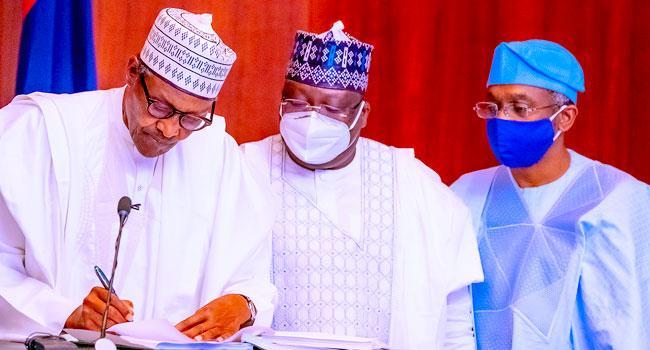President Muhammadu Buhari has signed the long-awaited Electoral Act Amendment Bill 2021.
At a short ceremony conducted in the Council Chamber of the Aso Villa in Abuja on Friday, President Muhammadu Buhari signed the law.
The measure was signed in the presence of Ahmed Lawan, President of the Senate, and Femi Gbajabiamila, Speaker of the House of Representatives.
Professor Ibrahim Gambari, the President’s Chief of Staff, and Boss Mustapha, the Secretary to the Government of the Federation (SGF), were among those in attendance.
This comes only a week before the President’s deadline to make a judgment on the proposed law, as stipulated by the Nigerian Constitution.
After receiving the bill from the National Assembly on January 31, different parties, including political players and civil society organizations, have been waiting for the Nigerian president to sign it into law.
According to reports, President Buhari was scheduled to sign the bill into law on Wednesday, despite public anger over the delay.
The bill’s signing, however, did not go as planned and was delayed for Friday, though sources claimed the President would stick to the new date.
On February 25, 2022, President Muhammadu Buhari, Senate President Ahmad Lawan, and Speaker Femi Gbajabiamila signed the Electoral Act Amendment Bill in Abuja.
Attempts to change the country’s electoral rules during the 8th National Assembly, sponsored by former Senate President Bukola Saraki and former Speaker Yakubu Dogara, were unsuccessful.
However, after an early setback, parliamentarians in the 9th National Assembly were successful in amending the statute.
President Buhari had refused to sign the law in November 2021, citing the cost of holding direct primary elections, security concerns, and the possibility of political actors manipulating voting procedures as grounds for his decision.
He eventually added certain conditions to his assent, prompting MPs to rework the measure, resulting in two versions being introduced in the Senate and House of Representatives chambers.
